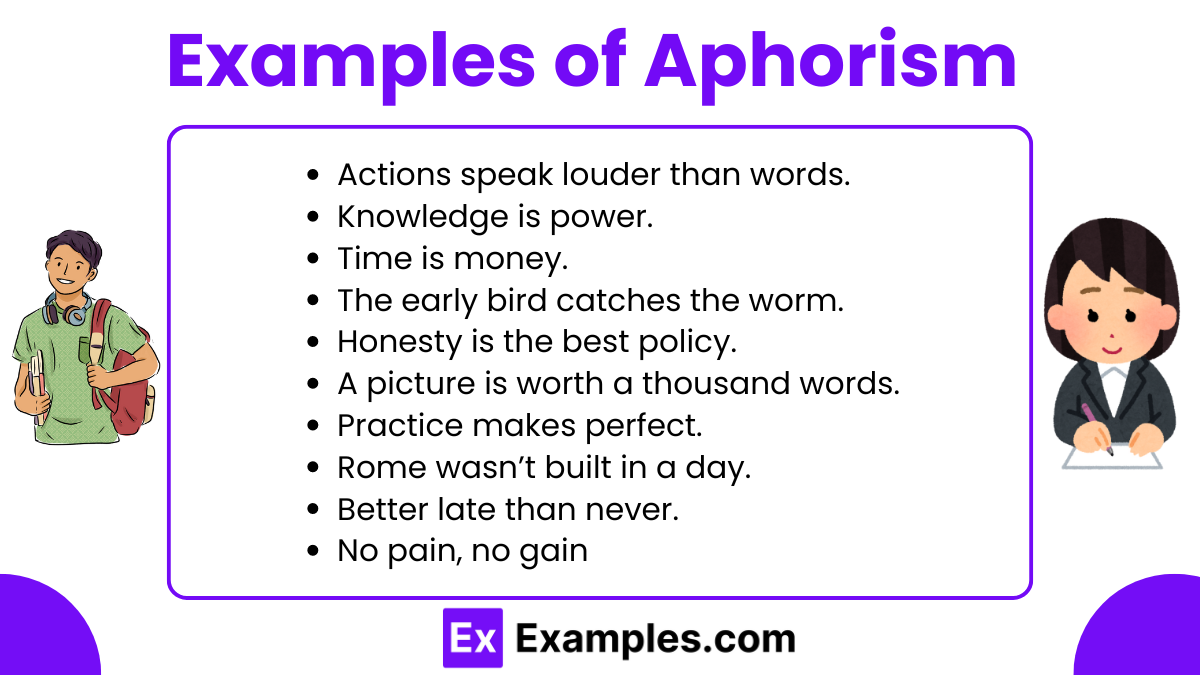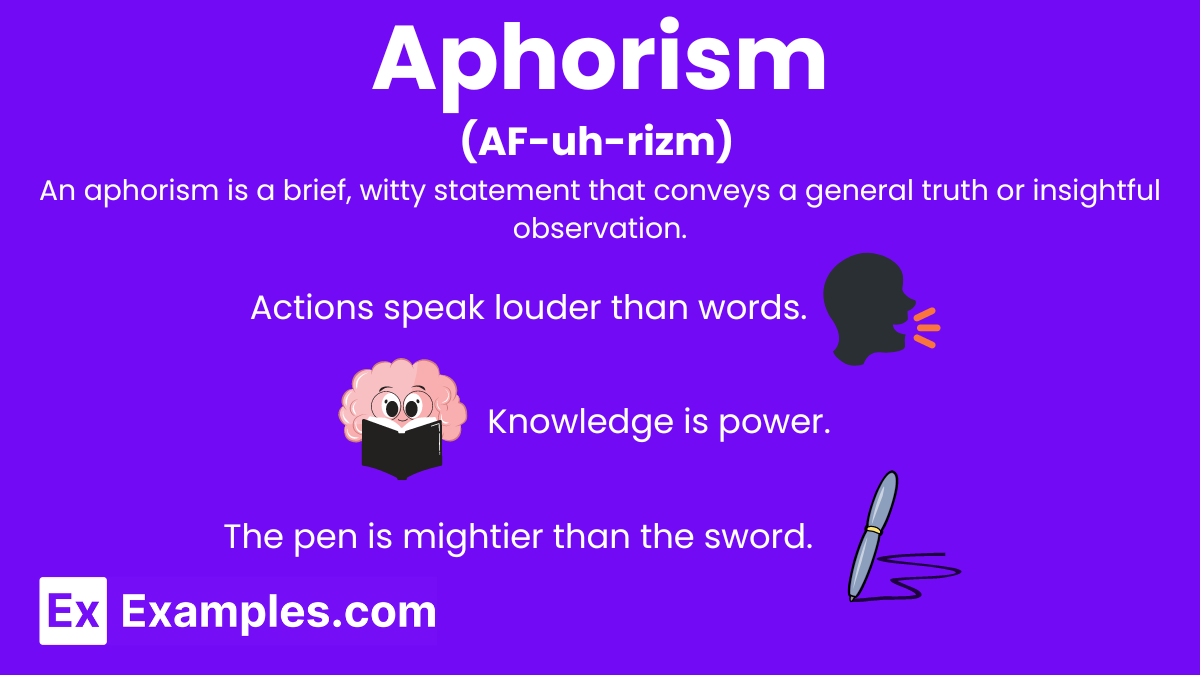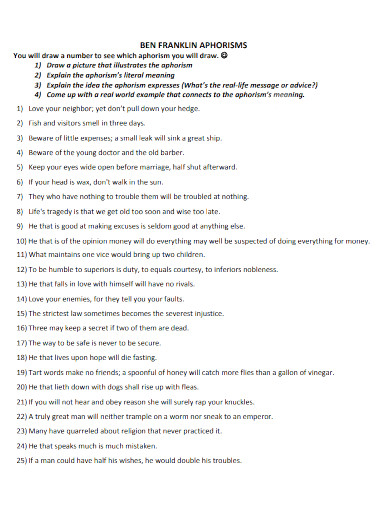80+ Aphorism Examples
An aphorism is a concise and memorable statement that expresses a general truth or principle. Often used in English literature and everyday speech, aphorisms are powerful rhetorical devices that convey wisdom and insight in a brief, impactful way. Writers and speakers use aphorisms to make their messages clear and relatable, helping to highlight important ideas through simple yet profound expressions. These statements are commonly found in proverbs, sayings, and literary works, making them a vital tool in effective communication.
What is Aphorism?
List of Aphorism Examples

- Actions speak louder than words.
- Knowledge is power.
- Time is money.
- The early bird catches the worm.
- Honesty is the best policy.
- A picture is worth a thousand words.
- Practice makes perfect.
- Rome wasn’t built in a day.
- Better late than never.
- No pain, no gain.
- Beauty is in the eye of the beholder.
- The pen is mightier than the sword.
- When in Rome, do as the Romans do.
- Necessity is the mother of invention.
- A journey of a thousand miles begins with a single step.
- To err is human; to forgive, divine.
- All that glitters is not gold.
- Absence makes the heart grow fonder.
- A watched pot never boils.
- Actions have consequences.
- Don’t judge a book by its cover.
- Easier said than done.
- Every cloud has a silver lining.
- Ignorance is bliss.
- It takes two to tango.
- Laughter is the best medicine.
- Look before you leap.
- Money can’t buy happiness.
- The grass is always greener on the other side.
- Two wrongs don’t make a right.
- You can’t teach an old dog new tricks.
Examples of Aphorism in Literature
1. To thine own self be true.” – William Shakespeare, Hamlet
2. “The unexamined life is not worth living.” – Socrates, as recorded by Plato in Apology
3. “All men are created equal.” – Thomas Jefferson, Declaration of Independence
4. “I think, therefore I am.” – René Descartes, Discourse on the Method
5. “Man is the measure of all things.” – Protagoras, as recorded by Plato in Theaetetus
6. “A thing of beauty is a joy forever.” – John Keats, Endymion
7. “That which does not kill us makes us stronger.” – Friedrich Nietzsche, Twilight of the Idols
8. “The only thing we have to fear is fear itself.” – Franklin D. Roosevelt, First Inaugural Address
9. “The truth is rarely pure and never simple.” – Oscar Wilde, The Importance of Being Earnest
10. “It is a truth universally acknowledged, that a single man in possession of a good fortune, must be in want of a wife.” – Jane Austen, Pride and Prejudice
Examples of Aphorism in a Sentences
- ctions speak louder than words.”
- She always believed that actions speak louder than words, and she proved it by volunteering every weekend.
- “Knowledge is power.”
- He knew that knowledge is power, so he spent hours in the library every day.
- “Time is money.”
- The contractor worked efficiently, always reminding his team that time is money.
- “Honesty is the best policy.”
- She decided to tell the truth because she was taught that honesty is the best policy.
- “A picture is worth a thousand words.”
- The photo captured the emotion perfectly, proving that a picture is worth a thousand words.
- “Rome wasn’t built in a day.”
- He reminded his students that Rome wasn’t built in a day and encouraged them to keep practicing.
- “Better late than never.”
- She finally finished her degree after many years, believing that it’s better late than never.
- “No pain, no gain.”
- The coach pushed his athletes hard, often saying no pain, no gain to motivate them.
- “Beauty is in the eye of the beholder.”
- He didn’t care what others thought, knowing that beauty is in the eye of the beholder.
- “The pen is mightier than the sword.”
- She chose to write her way to change, convinced that the pen is mightier than the sword.
Examples of Aphorism in Poetry
- “Hope is the thing with feathers.” – Emily Dickinson
- “To err is human; to forgive, divine.” – Alexander Pope, An Essay on Criticism
- “Good fences make good neighbors.” – Robert Frost, Mending Wall
- “The child is father of the man.” – William Wordsworth, My Heart Leaps Up
- “A little learning is a dangerous thing.” – Alexander Pope, An Essay on Criticism
- “A thing of beauty is a joy forever.” – John Keats, Endymion
- “The paths of glory lead but to the grave.” – Thomas Gray, Elegy Written in a Country Churchyard
- “’Tis better to have loved and lost than never to have loved at all.” – Alfred Lord Tennyson, In Memoriam A.H.H.
- “Beauty is truth, truth beauty.” – John Keats, Ode on a Grecian Urn
- “The best laid schemes o’ mice an’ men / Gang aft agley.” – Robert Burns, To a Mouse
Examples of Aphorism About Life
- “Life is what happens when you’re busy making other plans.” – John Lennon
- “Life is short, art long, opportunity fleeting, experience treacherous, judgment difficult.” – Hippocrates
- “Life is really simple, but we insist on making it complicated.” – Confucius
- “Life is a journey, not a destination.” – Ralph Waldo Emerson
- “Life is a dream for the wise, a game for the fool, a comedy for the rich, a tragedy for the poor.” – Sholom Aleichem
- “Life is 10% what happens to us and 90% how we react to it.” – Charles R. Swindoll
- “Life is either a daring adventure or nothing at all.” – Helen Keller
- “Life is too important to be taken seriously.” – Oscar Wilde
- “Life is a succession of lessons which must be lived to be understood.” – Ralph Waldo Emerson
- “Life is made of ever so many partings welded together.” – Charles Dickens
Examples of Aphorism in Movies
- “May the Force be with you.” – Star Wars
- “There’s no place like home.” – The Wizard of Oz
- “I’ll be back.” – The Terminator
- “Life is like a box of chocolates; you never know what you’re gonna get.” – Forrest Gump
- “Carpe diem. Seize the day, boys.” – Dead Poets Society
- “With great power comes great responsibility.” – Spider-Man
- “You can’t handle the truth!” – A Few Good Men
- “To infinity and beyond!” – Toy Story
- “Just keep swimming.” – Finding Nemo
- “Houston, we have a problem.” – Apollo 13
Characteristics of Aphorism
- Conciseness: Aphorisms convey ideas in a brief and succinct manner.
- Wit: They often use clever language and sharp insight.
- Universal Truths: Aphorisms express universally acknowledged truths or principles.
- Memorability: Their phrasing is memorable and easy to recall.
- Clarity: Aphorisms present ideas clearly and directly.
- Insightfulness: They provide deep insights into human nature or the world.
- Timelessness: Aphorisms remain relevant across different eras.
- Simplicity: They use simple language to express complex ideas.
- Moral Lessons: Aphorisms often contain ethical or moral lessons.
- Pithiness: They are rich in meaning despite their brevity.
Favorite Aphorisms Related to Science
Functions of Aphorism
- Convey Wisdom: Aphorisms communicate wise and insightful messages.
- Encapsulate Truths: They summarize universal truths in a memorable way.
- Inspire Thought: Aphorisms provoke reflection and deeper thinking.
- Guide Behavior: They offer guidance on ethical and moral conduct.
- Enhance Communication: Aphorisms make communication more effective and engaging.
- Simplify Complex Ideas: They break down complex concepts into understandable statements.
- Create Impact: Aphorisms leave a lasting impression on the audience.
- Facilitate Teaching: They serve as useful tools for teaching and instruction.
- Encourage Reflection: Aphorisms prompt individuals to consider different perspectives.
- Strengthen Writing: They add depth and clarity to written and spoken language.
How to Use Aphorism in a Sentence
An aphorism is a brief, witty statement that conveys a general truth or insightful observation.
Identify the message
Choose an aphorism that conveys the desired message.
Ensure relevance
Make sure the aphorism relates to the context of your sentence.
Integrate smoothly
Blend the aphorism naturally into your sentence.
Provide clarity
Use the aphorism to clarify or emphasize a point.
Tips for Using Aphorism
- Know Your Audience: Use aphorisms that resonate with your audience’s values and understanding.
- Be Contextual: Ensure the aphorism fits naturally within the context of your discussion.
- Keep It Relevant: Choose aphorisms that directly relate to your main point or argument.
- Maintain Clarity: Use aphorisms to clarify and emphasize your message, not to obscure it.
- Use Sparingly: Avoid overusing aphorisms to prevent your writing or speech from becoming clichéd.
- Blend Naturally: Integrate aphorisms smoothly into your sentences to maintain a natural flow.
- Provide Explanation: If the aphorism is not commonly known, briefly explain its meaning.
- Emphasize Key Points: Use aphorisms to highlight and reinforce important points in your communication.
- Be Concise: Ensure the aphorism doesn’t make your sentence unnecessarily long or complex.
- Engage Emotionally: Choose aphorisms that evoke an emotional response, making your message more memorable.
What is an example of an aphorism?
“Actions speak louder than words” is an example of an aphorism, conveying that what people do is more significant than what they say.
What is a famous aphorism?
“Knowledge is power” is a famous aphorism, emphasizing the importance and influence of education and information.
What does aphorism mean for dummies?
An aphorism is a short, clever saying that expresses a general truth or wise idea in a memorable way.
What are two synonyms for aphorism?
Two synonyms for aphorism are “proverb” and “maxim,” both conveying brief, wise sayings.
How to pronounce aphorism?
Pronounce aphorism as “AF-uh-riz-um” with emphasis on the first syllable.
What is an aphorism for kids?
For kids, an aphorism like “Honesty is the best policy” teaches the importance of telling the truth in a simple way.
What is an aphorism in the Bible?
In the Bible, an aphorism is a concise statement of truth, like “Pride goes before destruction” from Proverbs 16:18.
Why do people like aphorisms?
People like aphorisms because they convey wisdom succinctly, making complex ideas easy to understand and remember.
What is the best use of aphorism?
The best use of an aphorism is to highlight and emphasize important truths or insights effectively in communication.
What makes a good aphorism?
A good aphorism is concise, memorable, insightful, and universally applicable, often using clever language.




